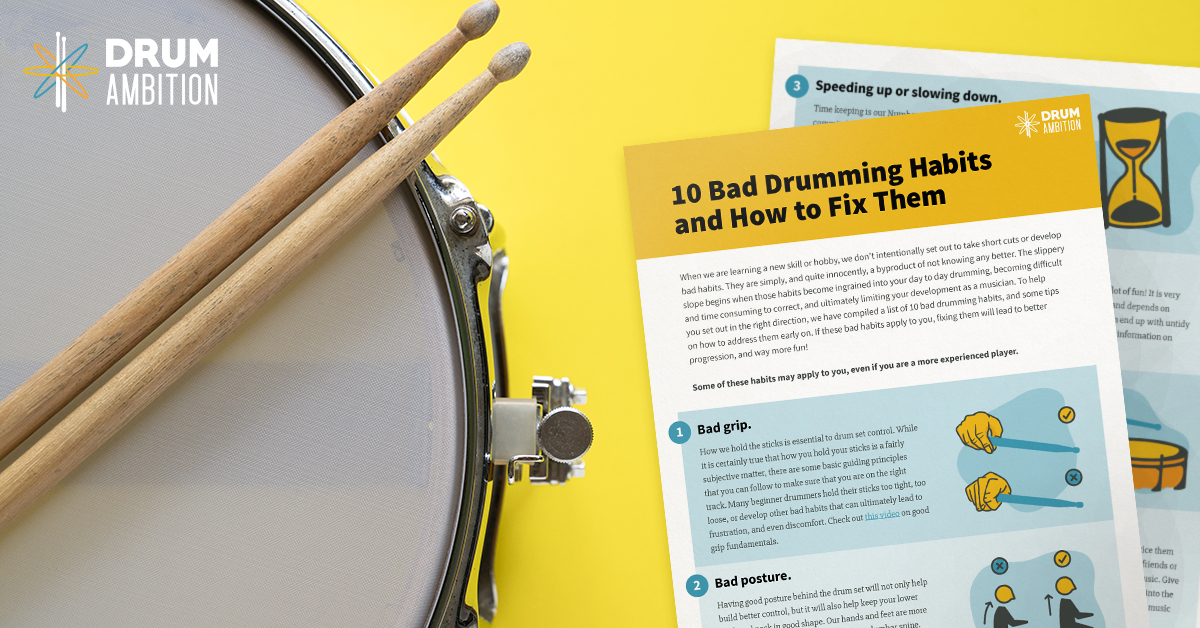We all know that practicing is the key to success on any musical instrument, and the drums are certainly no different. However, some natural barriers can make committing to a regular practice routine quite challenging.
Perhaps you don't have time to practice, are not motivated, or have hit other natural plateaus? Don't worry. You are not alone, and these are all common scenarios. Drum Ambition is here to help you rise above them and become the drummer we know you can be! Learning the drums is a great experience. It's fun, rewarding, and entertaining - all while being challenging and sometimes frustrating. When starting, most of us envision the day where we play along to our favorite songs, let loose, and do some serious drum stick shredding. Practice is key, and we can help you get there!
Helpful related articles:
Sound control - Practical means of managing drum set volume.
Keeping motivated to practice the drums.
While basic early progress on the drum set is attainable relatively quickly, you'll need to commit to some practice time if you want to get the most out of the instrument. Understanding how to practice is essential, and we've covered it in this article. This blog is about a topic that affects the majority of hobbyist drummers - identifying and removing the barriers to practice. Here are five common scenarios, with tips on how to overcome them.
1. Limited time available to practice.
We all live busy lives, and finding practice time can often be difficult. The good news is that you can make good progress on your drumming if you can find just 5-10 minutes a day or every other day. You'll undoubtedly hear stories about someone else who is practicing hours a day, but the simple fact is that they may have different priorities, and their lifestyle enables them to do that. Most of us don't have that luxury, and it's quite OK. Do what you can when you can, keep a practice diary so that you can see your progress, and keep your precious practice time a good balance of focused goals and fun.
2. Not motivated to practice.
Not having the time to practice and not being motivated are two very different things. You may have just discovered over time that the drums may not be the instrument for you. That happens, and again, it's OK. But before you rush to put your dusty drum set on Craigslist or the local Free Ads, do a little self-appraisal and ask yourself if you paid enough attention to the fundamentals. Learning the drums can quickly break down if you have skipped too quickly through essential early grooves and fills. It makes the experience very difficult and can make you feel like you are not progressing. This is a marathon, not a sprint, so it is imperative to manage your expectations and commit to staying the course, even when you hit natural plateaus. If this were easy, everybody would be doing it.
3. No drum set available for practice.
Some people play during their drum lessons, some play at school, and others play in practice studios. Not everybody has a drum set at home, but that shouldn't mean that practice is out of the question. The early days of drumming are primarily about understanding rhythm and building coordination, and all of this can be done by air drumming or with a simple practice pad. Our article covered this at length: Do you need a drum set to learn to play? Consider researching local rehearsal studios if air drumming or working with a pad is not for you. Most are equipped with drum sets, and some offer special rates for drummers who want to rent a small room to practice. If you have a drum teacher, they may also have some suggestions on where you can practice.
4. Drum volume makes practice difficult.
There are more options than ever before to address this common problem. Electronic drums can be played using headphones, and acoustic drums have sound control pads that significantly reduce the volume and tone of the drums and cymbals. We wrote about this in detail in our article: Sound Control. Practical means of managing drum set volume. In the rare event that none of the tips outlined in that feature work for you, there is always air drumming. It works, and it is beneficial if you live in an apartment where playing, even with reduced volume, is still problematic.
5. Not knowing what to practice.
Not knowing what to practice can be frustrating. The Drum Ambition curriculum is designed for beginner drummers and hobbyists with more experience who want to get better. Every lesson has practice tips and goals that are understandable and attainable. All plans come with email and live chat support. You are never alone on this journey and can reach out at any time with questions on practice plans and goals.
Part of the key to success on the drums is keeping it fun. Don't stress about lack of practice to the point that it puts you off pursuing what you know can be an engaging and rewarding hobby. There's nothing wrong with doing things on your terms.
We are here to help!
If you have any questions about this article, please email [email protected].



